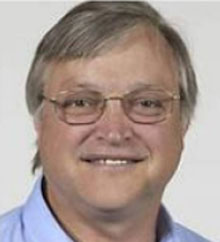Hilary Alan Calvert


- Year of birth: 1947
BIOGRAPHY
Hilary Calvert, a British oncologist, was responsible for the early clinical development of carboplatin, the analogue of cisplatin that showed similar anti-tumour activity to the parent compound with markedly less toxicity. At the Royal Marsden, collaborating with Eve Wiltshaw, Calvert demonstrated activity for carboplatin in ovarian cancer.
In 1985 he developed a dosage formula for carboplatin, known as the Calvert formula, which calculates the carboplatin dose needed to achieve a given AUC (area under the curve) while taking into account a patient’s glomerular filtration rate. When the carboplatin dose was calculated using the conventional mg/m2 basis, sporadic patients became severely thrombocytopenic, necessitating hospital admission and platelet transfusions. The formula prevents thrombocytopenia, allowing carboplatin to be successfully used worldwide and also prevents underdosing in patients with high kidney function.
Calvert studied mathematics and medical sciences at the University of Cambridge before completing his medical studies in 1972 at University College London. Later he submitted an MD thesis, ‘Antifolates and their application in cancer chemotherapy’.
Other career highlights include the discovery of the first-in-class folate-based inhibitor of thymidylate synthase, leading to the development of the drug raltitrexed, and contributing to the clinical development of pemetrexed and the first-in-class PARP inhibitor, rucaparib.
At the University of Newcastle, UK, Calvert set up a drug discovery programme responsible for development of inhibitors of DNA protein kinase and MDM2 that can inactivate P53, the tumour suppressor gene thought to be responsible for sarcoma progression. Both are currently in phase I trials. Calvert also wrote a computer program, MACREX, to prepare indexes for books and periodicals, which is used worldwide.
In 2009, Calvert received a lifetime achievement award, for which he was interviewed here, by which time he was director of cancer drug discovery and development at the UCL Cancer Institute in London.
This resource is also mentioned here:
Key Players
Research Centres
Contributions
-
European contributions to the diagnosis and treatment of ovarian cancer: a historical and modern perspective
-
Platinum chemotherapy: a mainstay in drug treatment - Carboplatin
-
Platinum chemotherapy: a mainstay in drug treatment - Cisplatin



